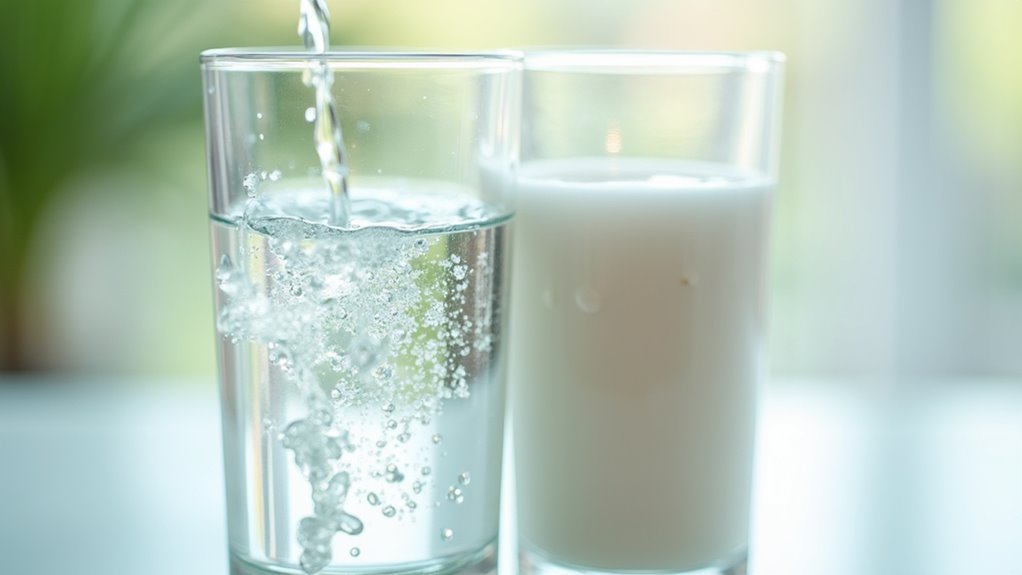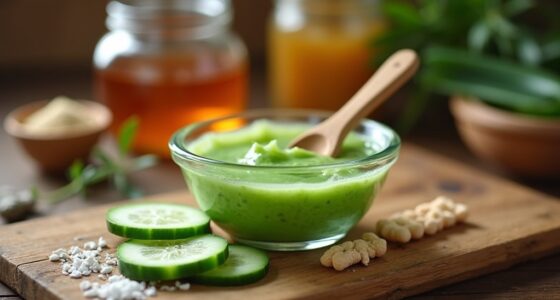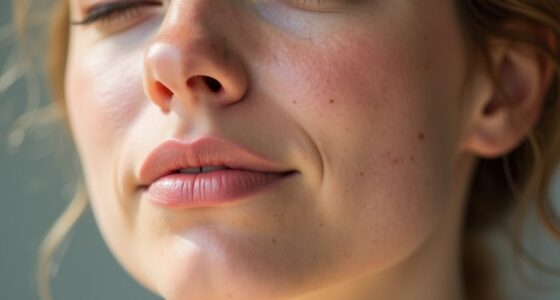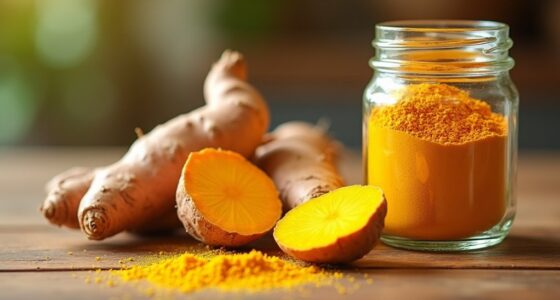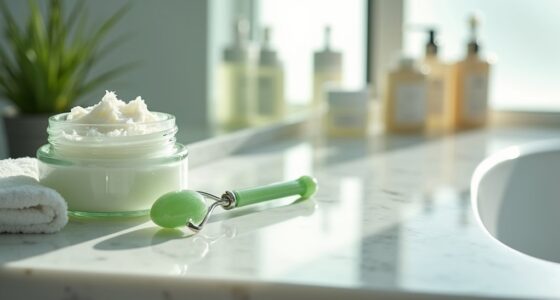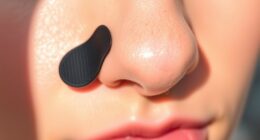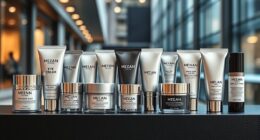Hydration refers to the water content within your skin cells, keeping your skin plump, smooth, and resilient, while moisturization involves applying products that lock in that water and create a protective barrier against dryness and irritation. Both are essential—hydration boosts water levels, and moisturizers maintain them. Understanding how they work together helps you choose the right products and routines for healthier skin. Keep exploring to learn how to effectively integrate both into your skincare.
Key Takeaways
- Hydration adds water to skin cells, making skin plump and smooth, while moisturization locks in that water to prevent loss.
- Hydrating products contain humectants like hyaluronic acid, whereas moisturizers often include occlusives and barrier-repair ingredients.
- Proper skincare involves applying hydrating agents first, then sealing with moisturizers for optimal skin health.
- Hydration addresses water deficiency, reducing dryness and dullness; moisturization maintains overall skin resilience and softness.
- Both are essential; hydration boosts water content, and moisturization sustains it, working together for healthy, balanced skin.
What Is Hydration and Why Is It Important?
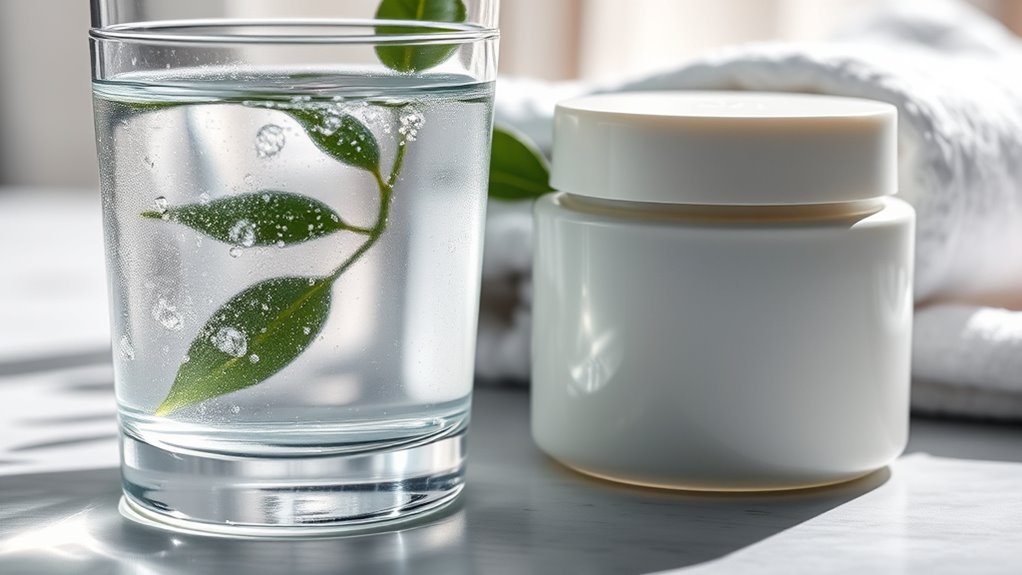
Have you ever wondered why your skin feels dry or tight even after applying moisturizer? That’s often because your skin isn’t properly hydrated. Hydration refers to the water content within your skin cells, which is essential for maintaining a healthy skin barrier. When your skin is well-hydrated, it can better retain water, keeping it plump and smooth. Without enough water, your skin barrier weakens, leading to dryness and irritation. Proper hydration boosts water retention, helping your skin stay soft and resilient. It’s not just about applying creams; it’s about ensuring your skin has enough water to function at its best. When your skin is hydrated, it can better defend against environmental stressors and look vibrant and healthy. Understanding the importance of hydration in skin health can guide you to better skincare habits. Recognizing the difference between hydration and moisturization can help you tailor your skincare routine more effectively. Additionally, using products that support skin barrier strength can further enhance your skin’s ability to stay hydrated.
The Role of Moisturization in Skin Care
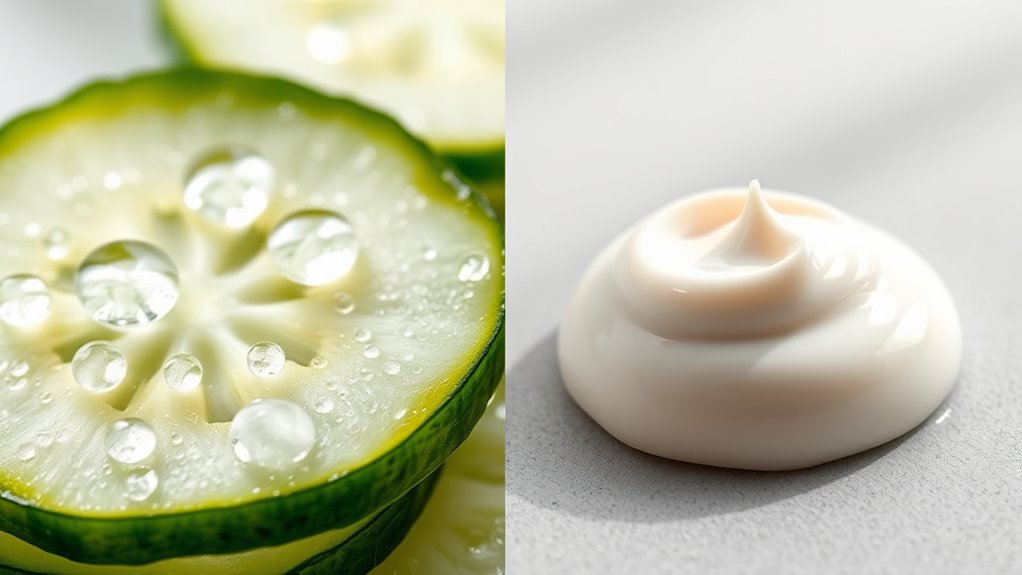
Moisturization plays a crucial role in maintaining healthy skin by forming a protective barrier that locks in moisture and prevents water loss. It helps keep your skin soft, smooth, and resilient. Many hydration myths suggest that drinking water alone suffices, but moisturizer types are equally important for sealing in hydration and protecting your skin’s surface. Different moisturizer types, like creams, lotions, and ointments, serve various skin needs—oily, dry, or sensitive. Using the right moisturizer ensures your skin stays balanced and reduces issues like irritation or cracking. Proper moisturization complements hydration, giving your skin the care it needs. Additionally, choosing the appropriate moisturizer based on your skin’s specific needs can significantly enhance its effectiveness. Incorporating ingredients like antioxidants can further protect your skin from environmental damage and support overall skin health. Understanding skin barrier function is essential in selecting the most suitable moisturizers for optimal skin health, especially as advancements in AI in Education continue to influence skincare technology and personalized recommendations.
How to Identify Your Skin’s Needs

Understanding your skin’s unique needs is the key to choosing the right skincare routine. To do this, identify your skin type—whether it’s oily, dry, combination, or sensitive. Observe how your skin reacts throughout the day; for example, if it feels tight or flaky, it might need more moisture. Also, consider environmental factors like exposure to sun, wind, or pollution, which can affect your skin’s hydration levels. Here are three steps to help you determine your needs:
- Examine your skin’s texture and oiliness in different areas.
- Notice how your skin responds to weather changes.
- Pay attention to signs like redness, irritation, or dullness.
- Stay informed about Lifestyle and recent AI discoveries that could revolutionize skincare research and treatment options. Additionally, understanding the importance of hydration and moisturization can help you tailor your routine effectively.
Best Products and Ingredients for Hydration and Moisturization
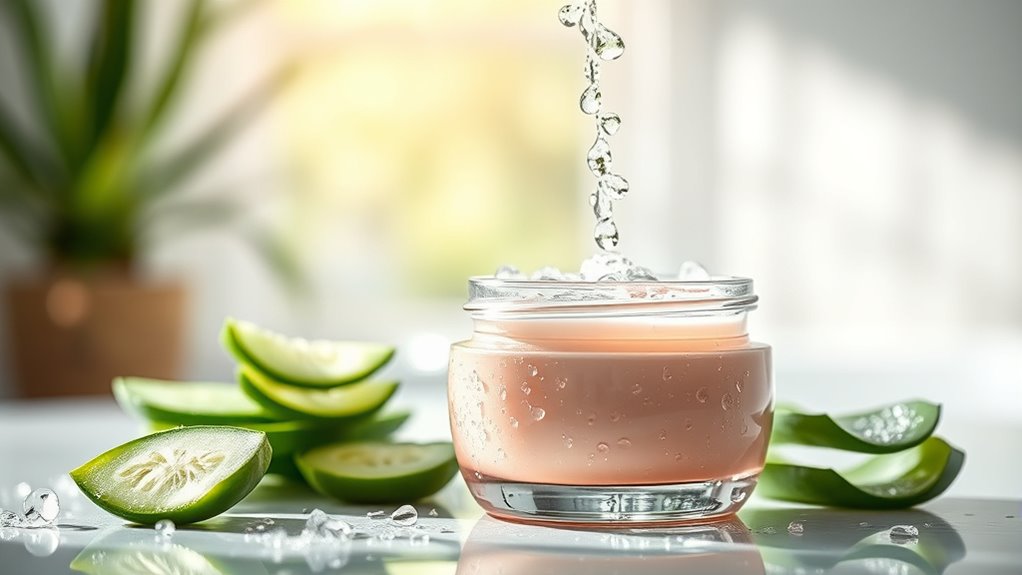
Choosing the right products for hydration and moisturization involves selecting ingredients that effectively replenish your skin’s moisture barrier. For hydration, look for gel-based products containing humectants like hyaluronic acid, glycerin, or aloe vera, which attract water into your skin. These ingredients help boost water content and keep your skin plump. For moisturization, focus on products with occlusive ingredients such as petrolatum, lanolin, or beeswax. These form a protective barrier, sealing in moisture and preventing water loss. Incorporating skin barrier repair ingredients like ceramides and fatty acids can further enhance your skin’s ability to retain moisture. Additionally, selecting products that support skin barrier health can provide long-term benefits for hydration. Using products designed to strengthen your moisture barrier can lead to improved overall skin resilience. Incorporating emollients into your skincare routine can also help improve skin softness and flexibility. Combining these types of products ensures your skin stays well-hydrated and protected. Be mindful to choose formulations suited for your skin type, and always check ingredient lists to avoid potential irritants. Properly selected products create a balanced approach to maintaining healthy, hydrated, and moisturized skin.
Tips for Incorporating Both Into Your Routine
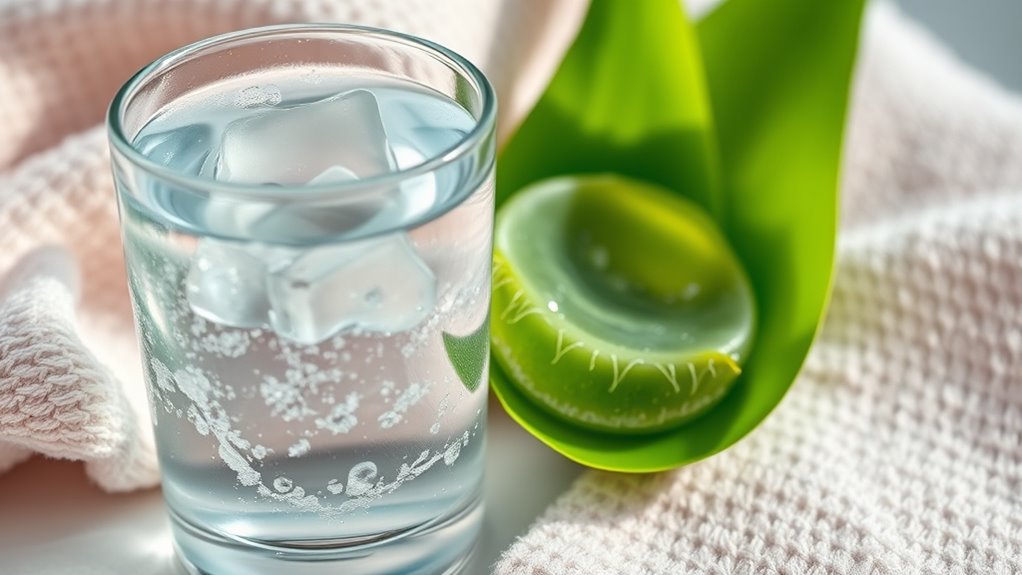
To effectively incorporate both hydration and moisturization into your skincare routine, start by applying a hydrating product first to boost water content, followed by a moisturizing product to lock in that moisture and create a protective barrier. Many hydration myths suggest you only need one or the other, but combining both maximizes skin health. Remember, proper moisturizer application techniques matter—pat gently rather than rub, ensuring even coverage. Incorporating proper skincare techniques and personal touches can also enhance your skincare experience, making it more meaningful. Using products with ingredients like hyaluronic acid or glycerin can further improve hydration levels. Additionally, understanding how skincare ingredients work together can optimize your routine’s effectiveness. Here are three tips to optimize your routine:
- Use water-based hydrators for quick absorption and hydration.
- Apply moisturizer while skin is still damp to seal in water.
- Layer products from lightest to heaviest for better absorption.
This approach helps you effectively balance hydration and moisturization, avoiding common misconceptions.
Frequently Asked Questions
Can Hydration and Moisturization Be Used Together Effectively?
Yes, you can use hydration and moisturization together effectively. Doing a dual application benefits your skin by addressing both water content and oil retention, leading to healthier, balanced skin. Make sure the products you choose have ingredient compatibility, so they work well without causing irritation. Applying a hydrating product first, followed by a moisturizer, helps lock in moisture and boost your skin’s overall health and glow.
How Do Climate Changes Affect Skin Hydration and Moisture Levels?
Think of your skin as a delicate garden, vulnerable to climate effects. As temperatures rise or fall, humidity shifts, and wind increases, your skin’s hydration and moisture levels wobble like a tightrope walker. Climate changes can intensify skin sensitivity, causing dryness or oiliness. To protect your skin, adapt your routine with hydrating products and nourishing moisturizers, helping your skin stay resilient despite the unpredictable weather.
Are There Any Risks of Over-Hydrating or Over-Moisturizing Skin?
You might risk over-hydrating or over-moisturizing if you use too much product or choose formulas that aren’t suitable for your skin. Overdoing it can weaken your skin barrier, making your skin more vulnerable to irritation and breakouts. Additionally, excessive moisturization can cause product buildup, leading to clogged pores. Always listen to your skin’s needs and adjust your routine accordingly to avoid these issues.
How Do Age and Skin Type Influence Hydration and Moisturization Needs?
Your age and skin type greatly influence your hydration and moisturization needs. As you age, your skin elasticity decreases, making it essential to maintain proper hydration. If you have oily skin, you might need lighter moisturizers, while dry skin benefits from more intensive hydration to boost moisture levels. Understanding your skin’s unique oil production helps you choose products that support ideal hydration and moisturization, keeping your skin healthy and resilient.
Can Diet Impact My Skin’S Hydration and Moisture Balance?
Think of your skin like a vintage radio—what you feed it matters. Your dietary choices, especially nutrient-rich foods, directly impact your skin’s hydration and moisture balance. Nutritional impact from vitamins, minerals, and antioxidants helps maintain healthy, plump skin. A balanced diet supports your skin’s natural barrier, reducing dryness and dehydration. So, eating well isn’t just good for your health; it’s a key part of skincare, too.
Conclusion
Think of your skin as a lush garden—hydration is the nourishing rain, while moisturization is the protective soil. By balancing both, you create a vibrant, resilient landscape that radiates health and glow. Don’t let your skin dry out or crack under pressure; instead, nurture it with the right care. When hydration and moisturization work in harmony, your skin blooms with energy, turning every day into a fresh, dewy morning.
